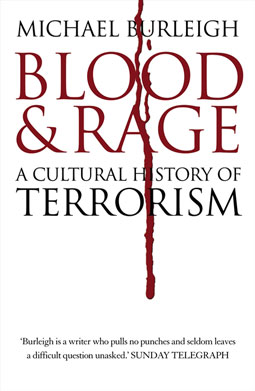After September 11, 2001, some Western intellectuals sought for the root causes of terrorism. Why did they hate us? Was it poverty? (as my local bishop pondered publicly " ignoring the privileged backgrounds of the hijackers). Was it Israel's fault? " not minding that none of them was Palestinian either. What then?
The violent methods of terrorists tempt us to suppose that tremendous ideological fervour, if not high principles, must be behind them.
 But according to Michael Burleigh the intellectual claims of terrorist movements are negligible: one example - the doctrines of the IRA - he dismisses as "theoretical gobbledygook". Terrorism, he declares, is a sociological, not an intellectual, phenomenon " the activity of resentful, psychotic young men with too much time on their hands.
But according to Michael Burleigh the intellectual claims of terrorist movements are negligible: one example - the doctrines of the IRA - he dismisses as "theoretical gobbledygook". Terrorism, he declares, is a sociological, not an intellectual, phenomenon " the activity of resentful, psychotic young men with too much time on their hands.
Blood and Rage is focussed less on the causes embraced by the world's terrorists " nationalism, Islamism, and what have you " than on what kind of people actually join cells and throw bombs.
Sub-titled "A Cultural History of Terrorism", this book isn't really anything of the sort: there is little discussion, for instance, about how terrorists have been celebrated in poetry, music and art.
It is, rather, a straightforward history of notable terrorists and their crimes. The author omits, for reasons of length he says, non-Western terrorism and also the acts of recognised governments (so you won't read about Lenin's State terror or Sri Lanka's Tamil Tigers - the world's most prolific suicide-bombers).
Except perhaps for Samson and the Philistines, terrorism was impossible before the advent of modern destructive technology. The story begins with the embrace of dynamite by Ireland's Fenians, and then by fin-de-siecle anarchists. Later chapters cover anti-colonialists, the 1970s New Left and the separatists of Ulster and Basque Spain, before turning to the festering sores of Palestine and Islamism.
Can terrorism be defeated? On the one hand, Burleigh seems to say no: there is a certain type of bored, alienated youth to whom random violence will always appeal: like the poor, they will always be with us. But on the other hand, governments are not powerless: effective policing works. Terrorist movements have been wound up, when their cells are infiltrated and their members arrested. We take for granted the skill with which Australian police have foiled schemes which aimed to visit hideous destruction on this country; and no doubt we will continue to do so, until such a scheme succeeds.
Some governments, particularly in the Muslim world where criminal justice is more flexible, have found it helpful to treat terrorist cells as a type of fanatical cult: people who leave them are offered practical help to reintegrate with their families and their communities, and in some cases, are persuaded to help the authorities detect and prosecute their former colleagues.
Would it compromise our sense of justice for the "Christian" world to learn from these techniques? Might the apostle Paul's advice to the Church in Rome equally apply to the State:
“If your enemy is hungry, feed him; if he is thirsty, give him something to drink. In doing this, you will heap burning coals on his head.” Do not be overcome by evil, but overcome evil with good.
Food for thought, at least.
Burleigh's undisguised contempt for his book's subject leads him to minimise terrorism's role in achieving political aims. He doesn't, for instance, credit terrorist violence with having played any role in Britain quitting Kenya, or France quitting Algeria. But the number of former terrorists from Menachim Begin to Nelson Mandela who have gone on to lead lawful governments, seems to undermine this thesis.
In Blood and Rage it is assumed there is nothing in common between the West's traditions of freedom and democracy, and the methods and aims of terrorism. Even terrorists agree: "You love life; and we love death", Al Qa'eda's military spokesman in Europe is quoted as saying.
It is certainly refreshing to encounter an author who is unashamed to apply moral categories to actions. Burleigh is known for this: Christians pondering contemporary society's devaluation of human life would do well to read Death and Deliverance, his passionate history of euthanasia in Germany from 1900 " 1945.
Yet the Christian reader can't help feeling a little let down: in each of these books, Burleigh fails to explain exactly why we are right, and they wrong. What is the ultimate source of our respect for life and freedom; and their repudiation of it?
Where religion appears to be a motivation for terrorism " as for instance in Irish republicanism " Burleigh sees it is as no more than a communal badge of identification. (If anything, the IRA were atheistic Marxists.) Burleigh agrees, therefore, with the received opinion that Islam itself does not endorse terrorist violence. In this book, it is secularists and their dreams of heaven on earth who dominate the terrorists' ranks.
Blood and Rage reminds us how transient these dreams are. Who now remembers what the Red Army Faction " in living memory the scourge of West Germany " were on about? Whatever happened to the anarchist movement " which assassinated a clutch of national rulers in the years leading up to (and thereby triggering) the First World War? They are one with Nineveh and Tyre.
If Al Qa'eda now has the world quaking in fear at where it will strike next, it will soon enough fade into history; and, while the Lord tarries, some other band of desperadoes takes its place.























